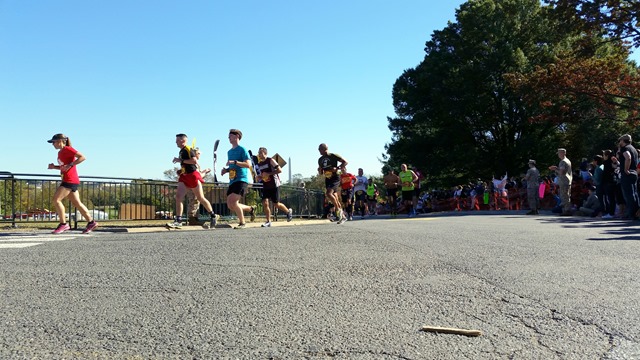
That’s also when the fun begins, she said. That’s when fatigue starts to set end, legs are tired and mental exhaustion starts to attack runners. A marathon, she said, is an humbling experience, especially when runners get to the 18-22 mile mark. Tinkey fully expected there to be some pain with running 26.2 miles, including an all-uphill final mile of the run. Her overall finish among the entire field of 11,271 was 239 with an average pace of 7:11 minutes per mile.

Tinkey, who received her commission as a second lieutenant in June 2022 and is now awaiting pilot training to being at the 80th Flying Training Wing’s Euro-NATO Joint Jet Pilot Training program, finished her second career marathon in fine form with a time of 3:08:12, taking 6th place among all female military members, 11th out of all females in the 25-29-year-old division, and 24th our almost 4,700 female runners. We all raised our hands to pay the ultimate sacrifice.” What we do could lead to that, but we will never stop fighting for each other, for what’s right, and moving forward for them. “All I can say is that the shock and pain we all felt was a feeling that drives me in my ‘why’ and keeps pushing me forward because this is real. “We were on the ground the day Nicole and 12 others were killed by the vehicle IED,” she said. Tinkey was a C-17 Globemaster III loadmaster and part of the historic airlift operations. 26, 2021, while providing security during evacuation efforts in Afghanistan. The 23-year-old Marine sergeant was killed Aug. Her race against the clock toward the finish line was for a personal friend – Sgt. of India, on 12 September 2008.This challenge, though, was personal. Upon strong recommendation of the UGC through a peer review process, the autonomous institute status was finally converted in to a Deemed-to-be-University by the Ministry of Human Resource Development (MHRD), Govt. Due to its size and spread of activities, it was converted into University Institute of Chemical Technology (UICT) on 26th January, 2002 and under the TEQIP of the World Bank it was granted full autonomy in 2004. The then UDCT grew in stature over the years and was granted partial autonomy by the University of Mumbai in 1985, which was taken to the next echelon under the concept of autonomy propagated by the University Grants Commission (UGC).

Technology, the Institute has grown to become a premier (deemed) university devoted to education, training, research and industrial collaboration in chemical engineering, chemical technology, applied chemistry, pharmacy, biotechnology and bio-processing. Established on Octoas University Department of Chemical Technology (popularly called UDCT) of the University of Bombay (now Mumbai), with the noble intention of advancing India’s knowledge reserves in chemical science and


 0 kommentar(er)
0 kommentar(er)
